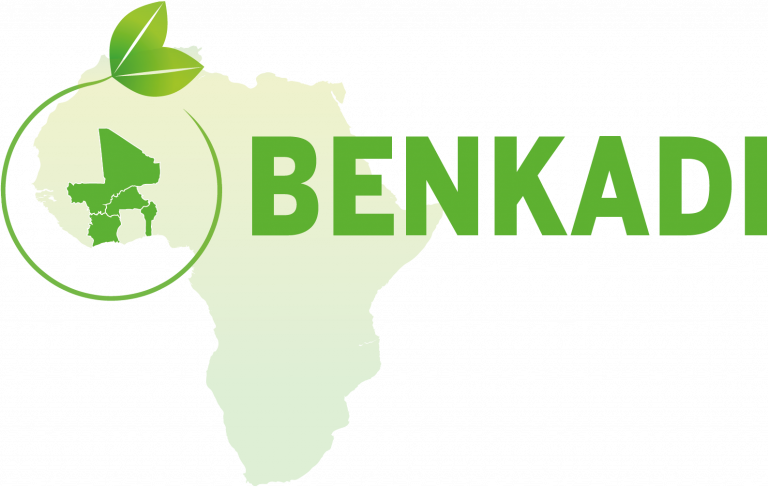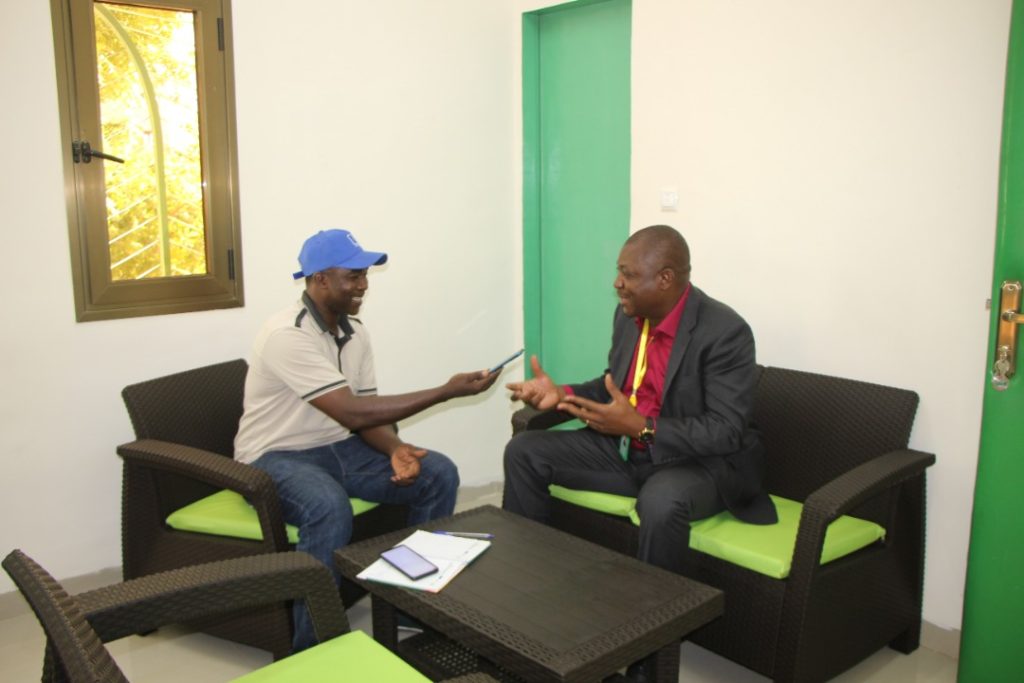COP15: "The greening of the Sahel is not an illusion, solutions exist", Sylvestre Tiemtoré, Regional Director of the Benkadi Program.
COP15 in Abidjan in May 2022 brought together 196 countries, 6,500 participants and 1,000 experts. They came together to find solutions to desertification, deforestation, farmland depletion and soil contamination. Among the delegations, African civil society was represented at various levels by umbrella organizations such as the Permanent Secretariat of Non-Governmental Organizations (SPONG).
We meet the coordinator and regional director of the Benkadi program. Sylvestre Tiemtoré is one of the international actors who has given voice to and proposed innovative solutions for the regeneration of the Sahel. We met him in the lobby of Hôtel Ivoire where the COP was held. Just after the side event organized by the Benkadi Program on advocacy and tools for sustainable land management in the Sahel to make communities more resilient to climate shocks. During this conference, the regional director of the Benkadi Program maintained his conviction: it is necessary to apply other complementary solutions, such as environmental taxes.
"Land. Life. Heritage: from a precarious world to a prosperous future" was the theme of COP15 in Abidjan. Do you think the theme reflected your expectations and aspirations during this COP?
I think the theme of COP15 is very timely. This theme puts the issue of land at the center of current issues, because when we talk about sustainable land management, we are talking about good land management and life for humanity. As long as we do not adapt sustainable land management to human practices, it goes without saying that human existence itself is threatened, as if humanity, if it refuses to change its way of life, risks losing its entire life. For us, this theme was really topical when we linked it to the issue of global warming, the harmful effects of climate change. The better we adapt in sustainable land management, the more carbon we can sequester, the more we can contribute to the reduction of global warming and the more resilient we are to the negative effects of climate change. So for us this is a real hot topic and it allowed the different actors to bring in their solutions, their good practices in sustainable land management.
SPONG has been participating in COP for several years, do you see significant progress over the years?
We have made very good progress. SPONG's participation in the COPs is improving every year. We have had learning moments where project officials have come to understand and learn the practices. When I realize that we organized our own event during this COP, I think we have come a long way. It is thanks to our participation in these international dialogues that we are part of several treaties, such as the Convention on Desertification, the Climate Convention and the Biodiversity Convention. From the Rio Convention, in which we participated, to our recent participation in the 15th COP, this is an important step forward that we welcome. I would like to take this opportunity to commend the efforts of the stakeholders who made this COP possible. And as we all know, a Conference of the Parties is a synergy of action that can move mountains. I am proud of this good relationship with the networks to which we are affiliated. Synergy is the key word for the success of these major international meetings.
The Benkadi program organized a side event on advocacy and tools for sustainable land management in collaboration with partners "les communautés reverdissent le sahel" and the NGO Tree Aid. Are you satisfied with the exchanges?
I am satisfied with this side event, where advocacy and sustainable land management tools to improve communities' resilience to climate shocks were reviewed, and where we were able to review the various experiences of the Benkadi Program partners, namely "Les communautés reverdissent le sahel" and Tree Aid, as well as convey the message about the mechanism for civil society consultation organized by desertification. I am also satisfied with the quality of results on the ground. I would also like to highlight the experience and quality of the operational tools that exist on the ground to enable actors to restore and reforest degraded land and also ensure sound forest management, which can either stop desertification or restore degraded land and ensure that communities invest in an irreversible reforestation cycle. Looking at the main recommendations that emerged from these exchanges, the actors call for synergy to be put at the service of different collaborators. In terms of advocacy, actors must be able to work together to find solutions and monitor commitments from the various stakeholders, government actors and decision makers, and ensure that commitments are taken seriously and that there is follow-up on expected objectives.
We have also insisted on the need to engage in environmental payment services so that populations involved in deforestation, or in ANR restoring vegetation cover, can live off their efforts and not fall into a cycle of degradation after reforestation.
Among the solutions that you propose, there are the paid environmental services, what are they and what guarantees for their effectiveness?
It must be said that the solution itself is a guarantee. When we talk about environmental payment services, we mean that when we get communities to invest in sustainable land management, to sometimes reforest Sahel areas, there is no guarantee that the reforestation cycle will not be broken again by drought, still due to anthropogenic action, such as illegal logging, slash-and-burn cultivation, forest fires and many others.
Thus, integrating environmental payment services also means that the communities that are re-greening these Sahelian areas can sell these investments as carbon credits on the international market, allowing the communities to live off their work with dignity. For example, if we take the case of Sayouba Zongo from the northern region, who single-handedly restored more than 100 hectares of forest, this man would have been a millionaire on an international scale because his contribution could have been evaluated in terms of carbon sequestration and sold on the international market as a carbon credit. This would have allowed his community to lift the anthropic pressure on this forest and live off this paid service, breaking the cycle of deforestation. Therefore, we think it is a sustainable solution. The big challenge is that in African countries we don't always have the capacity and expertise to make these assessments and also to capture this carbon credit market internationally. This means that the population does not understand the remote and even immediate importance of restoring these sometimes devastated areas. But if these environmental services became a reality, we would see a certain enthusiasm among the communities, who might even fight by all means to preserve what they have and become aware that protecting the environment is more profitable for them than cutting down or having trees cut down.
For COP15, besides organizing the panel, what were the other key actions carried out by SPONG and its partners?
The moments of the COP are also moments of rendezvous and lobbying. In addition to the parallel events that we have organized ourselves, we have taken part in other events that we have not organized. We also met with partners, including national and international ones. For example, we had discussions with the Environmental Intervention Fund in Burkina Faso, which wants to establish a partnership with SPONG, to see how we can support the effectiveness of the implementation of this environmental intervention fund in Burkina Faso, given our knowledge of civil society actors. We also took part in a panel on the Great Green Wall gas pedal where strategic information was provided on the opening of a call for applications for southern countries that AFD is exceptionally opening this year. I say exceptionally because usually AFD funds were channelled through French NGOs. Following a certain number of calls and advocacy, or because of other issues, AFD is now opening funds to NGOs in the South. Local authorities can also apply. We also participated in an event of a Canadian organization that accompanies the development of projects in the climate field. It is a Canadian mechanism that accompanies those who want to formulate projects in the theme of climate change. These were moments of sharing and meetings of actors that also allows us to expand the fields of action and networking according to the topics discussed with the partners who are present.
Some international experts like Manon Albagnac of the NGO Cari, said she was not very satisfied with the decisions of the COP. She says that the civil society organizations that are at this COP could have a little more of a warning or critical role towards the parties that do not respect their commitments, or even towards the secretariat, which does not push for sufficiently important decisions. Do you agree?
The conclusions of this COP have been mixed anyway and this is not surprising because it is a conference between the parties, as you know the parties are governments that discuss among themselves with the coordination of the United Nations system that is in charge of the desertification convention. So from these consultations, the States did not want to go to binding agreements. It should be noted that in the climate field, when we say that the agreements are binding, there is no mechanism of constraint or sanctions that can oblige a State or another. Countries that have already made commitments at the climate level are not yet ready to make other resolutions that will force them to combat desertification. This is a real shame. It is a pity because climate change and desertification are closely linked phenomena. The actors of the society would have liked the States to take firm commitments, however I think that we should not throw the baby out with the bath water. Already with the initiatives of Abidjan that President Ouattara announced, it shows that it is possible with a commitment and a political will to mobilize resources because the Ivory Coast and many forest countries realize with amazement that in twenty years, all their forests are disappearing and understand the urgency to act. Burkina Faso is not a forest country, but it is also high time to act because we have land degradation situations that are also alarming. For example, more than 200,000 hectares of land are degraded every year. So I think that the most important thing for us is to fight at the national level...
Do you have a particular message for us?
Yes, my first message is addressed to our partners such as the Dutch Ministry of Foreign Affairs and the NGO Woord en Daad. For them, we want to emphasize that we are a bit disappointed that solutions exist on the ground. But despite these solutions, the rate of land degradation is increasing even if these solutions can be put into practice on a large scale. During this COP, we announced initiatives, measures and accelerators. It would be really good if these measures, these accelerators, were put into practice for the benefit of grassroots communities and actors close to the community, i.e. civil society, local authorities, so that we can accelerate the scaling up of these different solutions.
For the grassroots communities themselves, or the implementing partners, I hope that they can redouble their efforts and join the sustainability perspectives as we said, that they apply other complementary solutions, such as paid environmental services. Because, one thing is to bring the communities to register in the re-greening, the reforestation, but as long as the populations are not going to live of this approach in addition to what they make in the chain of values, we risk not reaching our objectives.
Interview by Victor Komondi
Communication and Advocacy Expert
Project Benkadi Burkina Faso
Mail : victorkom@gmail.com

